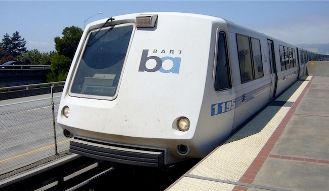Good: BART strike backfires badly for unions
by CalWatchdog Staff | July 9, 2013 6:15 am
July 9, 2013
By Chris Reed
When San Francisco Public Defender Jeff Adachi took on the enormous pensions [1]that were hollowing out the city’s budget in 2011, nearly all the big name Democrats in the Bay Area wouldn’t back him up. Led by Nancy Pelosi and Dianne Feinstein, they instead supported a much more modest reform[2] that had been crafted with public employee unions’ input.
 But have times changed in the most liberal chunk of California? Maybe. As John Wildermuth pointed out[3] on Fox & Hounds Daily, the BART strike triggered fury in the Bay Area — with strikers, not management.
But have times changed in the most liberal chunk of California? Maybe. As John Wildermuth pointed out[3] on Fox & Hounds Daily, the BART strike triggered fury in the Bay Area — with strikers, not management.
“Instead of local politicians joining union workers on the picket line, civic and political leaders pushing behind the scenes to have BART settle and little kids handing out cookies to the strikers, there was plenty of anger and it was all aimed at the union.
“Union leaders failed to recognize that it’s a new day in California. In the past few years, retirees have seen their nest eggs evaporate, people have been forced from their homes and workers who have been employed their entire adult lives suddenly found themselves with no job and no prospects.
“Sure, BART workers have gone four years without a raise, but that average annual salary of $50,000, $60,000 or $70,000, plus healthy benefits, sounds pretty good to people trying to raise a family on part time work or unemployment payments.
“To show just how strong the anti-union sentiment was, the day after the strike ended BART officials were forced to warn commuters not to berate, harass or threaten the workers who were back on the job.”
No longer partisan to question union members’ extreme pay, benefits and clout
 That actually lowballs what BART workers make[4], according to the San Jose Mercury-News[5]:
That actually lowballs what BART workers make[4], according to the San Jose Mercury-News[5]:
“BART employees — including management and nonunion workers — earn an average of about $83,000 annually in gross pay, contribute nothing toward their retirement and $92 monthly to health insurance. Their pay and total compensation are both the highest in the Bay Area among transit agencies.
“BART has offered an 8 percent pay hike over four years and wants workers to pay more toward their medical and pension benefits. The local Service Employees International Union and Amalgamated Transit Union, which represent more than 2,300 train operators, maintenance employees and other blue-collar workers, are looking for a 23 percent pay bump and are willing to contribute more toward benefits, just not as much as management wants.”
As I noted last week, given that these workers “contribute nothing toward their retirement and $92 monthly to health insurance,” their total annual compensation has to be worth upward of $130,000 a year. The Fox & Hounds piece also leaves out the “step” raises many get just for years on the job.
But the basic point Wildermuth makes is crucial: The understanding that public employee pay and benefits are far too high and are a function of political clout has settled in across the ideological spectrum. When you pay janitors $70,000[6], that’s not social justice. That’s a giveaway of public resources.
Where from here? The final word goes to Wildermuth:
“Union officials are trying to make lemonade out of their lemon of a walkout, saying they went back to work out of respect for [BART] customers and that it’s up to management to come up with a better, fairer offer before Aug. 4.
“Of course, no union has ever ended a strike when they were convinced they were winning. And if people hated a four-day strike in July, how is another month going to make a new walkout more palatable?
“So the BART unions go into this month of negotiations in worse shape than in the days before the strike.”
- took on the enormous pensions : http://www.sfgate.com/bayarea/article/Jeff-Adachi-s-pension-reform-plan-OKd-for-ballot-2336386.php
- more modest reform: http://www.foxnews.com/us/2011/11/05/pension-reform-hot-button-issue-in-sf-mayors-race/
- John Wildermuth pointed out: http://www.foxandhoundsdaily.com/2013/07/its-a-new-day-for-california-labor/?utm_source=feedly
- lowballs what BART workers make: http://www.calwatchdog.com/2013/07/03/pay-benefits-so-lavish-that-bart-workers-deserve-0-raise/
- San Jose Mercury-News: http://www.mercurynews.com/breaking-news/ci_23581424/full-speed-ahead-day-2-bart-strike
- pay janitors $70,000: http://www.calwatchdog.com/2013/06/06/70k-for-janitors-rate-hike-should-revolt/
Source URL: https://calwatchdog.com/2013/07/09/good-bart-strike-backfires-badly-for-unions/